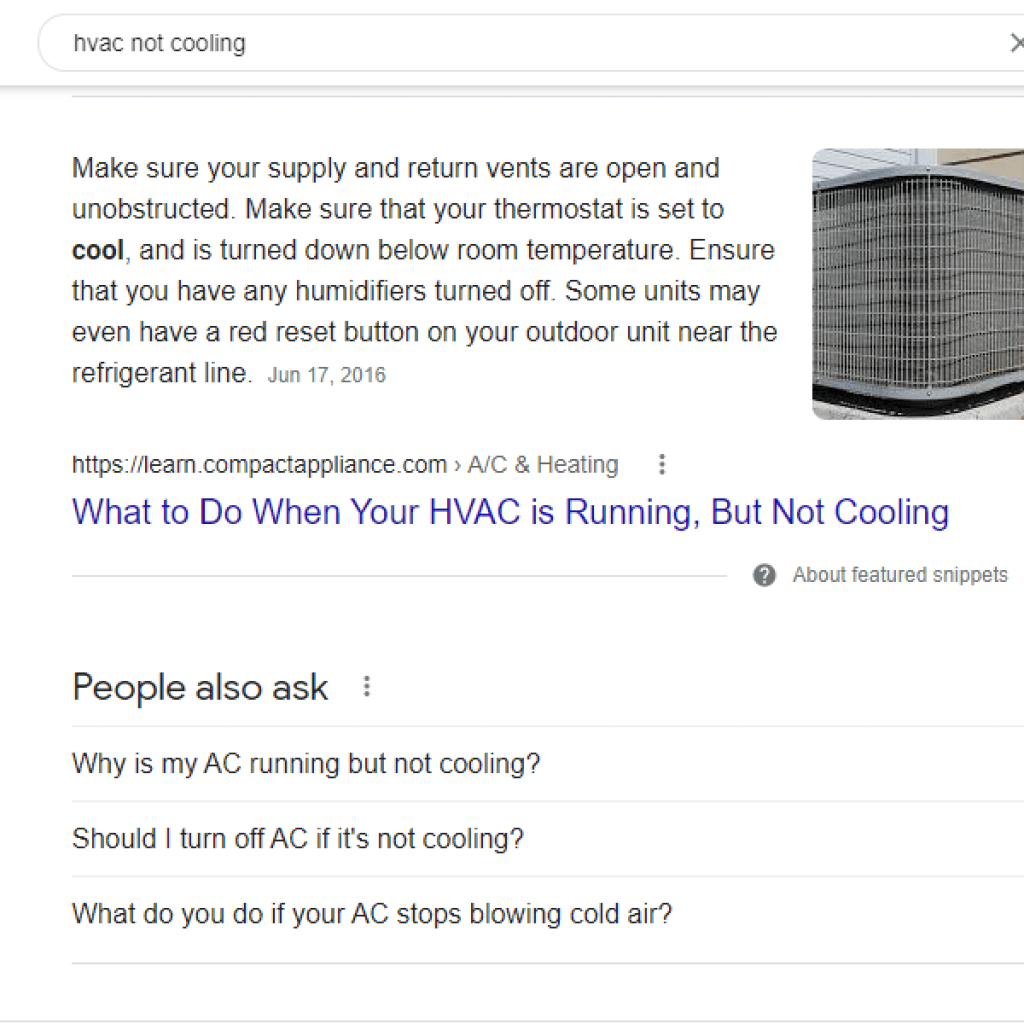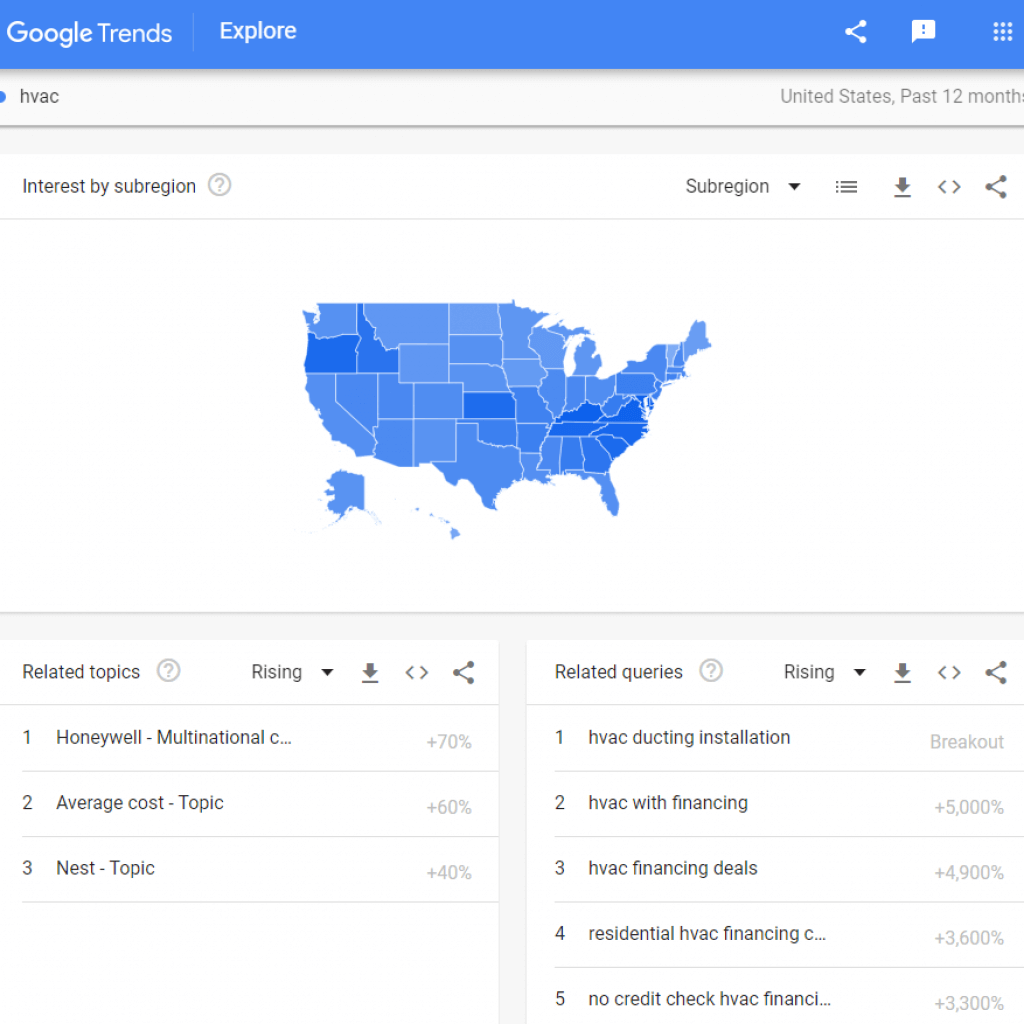Before a customer reaches out to you for help, they head to Google and search for a solution to the HVAC system problem they’re having. They type their question, click enter and see what pops up. Many of these users scroll right past the browser ads up top. That’s because they are looking for answers, not a promotional advertisement. This is exactly why writing many different HVAC articles for homeowners is critical to your content marketing strategy’s success.
Wouldn’t it be nice to have both an ad and an article on the first page of a potential client’s query? You’d automatically increase your chances of being noticed and clicked.
That’s what this article is all about: helping HVAC businesses interested in content marketing, but unsure where to start. If you need help figuring out what a customer HVAC article looks like, this is it. Let’s dive in.
What Are Homeowner-Friendly HVAC Articles?
HVAC articles for homeowners are meant to provide answers for someone searching online or googling questions. The article should address the question with a thoughtful answer that’s short enough to keep it interesting, but long enough to cover all the bases. It’s true that long-form articles tend to have better SEO properties, but sometimes the answer is simple. Never force it just to make it longer.
Tips To Create the Best Content
Here are five simple tips every HVAC company should follow to create the best online content possible.
1. Be Specific and Keep It Simple
Pick a specific topic, and don’t overthink it. Describe and identify the problem, relate to the customer and answer the question.
2. Synonyms Work
Think of different ways someone might ask the same question, and use these synonyms as article subheadings. Equally important, the “people also ask” results on Google are also a helpful resource. Here’s an example:

If the topic of the article is answering a simple ask like HVAC not cooling, another commonly asked question is: why is my AC running but not cooling? Make this a subheading and answer this question in the same article. Doing this helps Google and users find your articles easier. It also increases the chances of your article showing up on the first page of search results.
3. Keep Content Interesting For Readers
You can accomplish this by taking your local business community into account. In your content, relate to them, their unique HVAC or IAQ problems, inside jokes, etc. Keep it roughly 95 percent professional and be the expert, but show a little personality every now and then.
4. Cite and Link to Sources
This is important if you don’t want Google to ding your site’s content for plagiarism. If this happens, you’ll never have HVAC articles show up on the first page of search results.
5. Bonus Points
On top of creating written articles, it’s always great to add visual elements to help readers quickly understand the content. Adding an image or infographic is always a good idea, but not necessary.
Best Resources for HVAC Article Topics
Coming up with good HVAC topics to write about is easier than you think. You just need to be resourceful. Fortunately, the following resources are already in your office or simply a click away.
HVAC Service Techs and Customer Support Teams
These are the people you want to tap for topic ideas. They are asked so many questions every day. For this reason, ask employees to log the questions they’re asked by customers over the phone or while in the field. If the same question is asked multiple times, it probably deserves an article.
Check Out HVACContent.com‘s HVAC Articles for Homeowners
This website has many different customer-facing HVAC content pieces already written and available to download as a PDF. You can find all sorts of HVAC articles for homeowners here. The content is free to use. However, it’s important to use these articles as inspiration. Copying and pasting the entire article onto your website isn’t the best use of this content. Homeowners searching for answers will notice a copied article. A better bet is to pull a sentence or section from the articles, cite the source and elaborate to create an original article of your own. You can check out available articles here.
Google Trends for Content Tools
Using Google Search and Google Trends is helpful for creating better articles.
- Google Search helps you gain insight on searcher intent, topic and keyword research.
- Google Trends shows what content is trending based on the number of times a keyword or phrase is searched. Not only that, it displays related queries. As you can see below, HVAC financing seems to be a hot topic right now.

Writing about trending niche topics in HVAC, especially when it applies to your local business community, is your best bet. That’s because when users in your area search for that topic, they’ll find your article.
The Benefits of HVAC Articles for Homeowners
A content strategy that focuses on HVAC articles for homeowners will not have an immediate impact on your business. Rather, HVAC articles are seen as a long play in marketing. It takes roughly six to nine months of consistently putting out articles for Google and other search engines to notice. Only then will your business reap the benefits of a content-focused strategy. These benefits include:
- Positioning your company as an industry expert
- Saving money on marketing strategy
- Quality lead generation
- Searchers will stay on your website longer, AKA improved bounce rate
- Increase in website traffic
- More social media followers
- Improved search engine rankings
The Takeaway
While taking the time and effort to create HVAC articles for homeowners and potential customers may seem like a considerable effort, the business benefits are worth it. In today’s digital world, a content-focused marketing strategy is ideal.




